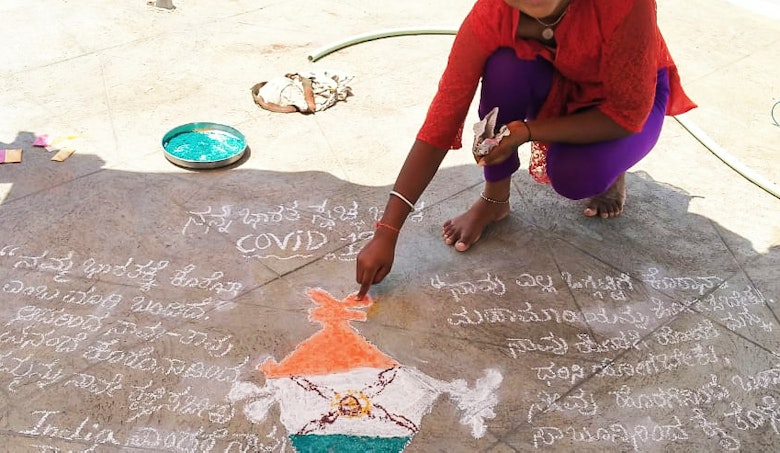The Colours of COVID
Art has always been a form of expression. Every art form is rooted in culture which brings people from a community together.
Rangoli/Kolam design is an art form practiced in India, where people (mostly women) use coloured rice powder and design intricate patterns on the ground during festivals, celebrations, or sometimes even as a daily ritual. At the crack of dawn, seeing women crouched in front of their doorstep skillfully creating these designs is a common sight in most of India.
Terre des Hommes - Netherlands in India decided to bring the community together during the testing times of COVID-19, by organising a Rangoli contest in its project areas across the state of Karnataka. These projects focus specifically on adolescent girls and women vulnerable to exploitation, who are prey to the ills of child marriage and the Devadasi system practiced in the region.
These girls were educated about COVID-19 and asked to come out with rangoli designs to spread awareness on the infection. With an inborn skill for the art, early married girls and victims of the Devadasi system showcased their talent in creating their own IEC (Information, Education and Communication) material about the virus through these rangoli designs.
The streets in the villages of these eight project districts were filled with innovative rangoli designs which caught the eye of many passersby. It also empowered women who were victims of exploitation to use their skill for a communal benefit, making them believe in the impact that they can create.
“Every morning I do a rangoli design in front of my house. The rangolis that I normally do are quite different to the ones I’ve done to spread awareness on COVID-19. When I was designing these rangolis, my neighbours and people around were impressed and started doing similar awareness rangolis in front of their houses. I feel so happy and proud that my artwork inspired many others to spread awareness”, says an excited Kamalamma* from Chamarajanagar district, a beneficiary of the Initiative for Married Adolescent Girls’ Empowerment (IMAGE) in Karnataka.
The contest began in May and the winners were announced on the 20th day of the month. Three prizes were given in each district where the contest was held.
TdH-NL in India thanks it’s partners, Child Rights Trust, Vidyanikethan, PMSR, REACH, SEVAK, Arpanam Trust, SNEHA, Mukta Network, Chaitanya Mahila Sangha and Jagruthi for their great support in organising the contest.

